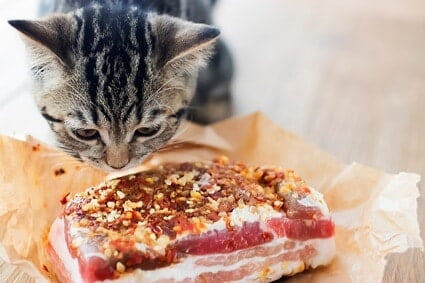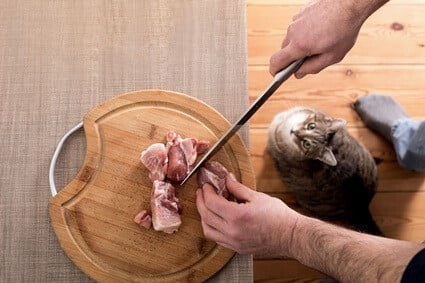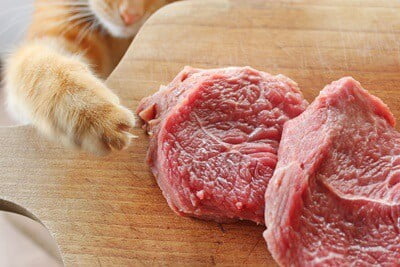Cats are carnivorous animals, meaning that their diets should primarily consist of meat (protein). However, not all meats are healthy. Pork is neither a white or red meat, but it’s usually classified as the latter. Commercial cat meals contain a mixture of different meats, with pork normally excluded from the list.
Pork can be fed to a cat once thoroughly cooked and all of the bones have been removed. Pork is a rich source of protein (amino acids), iron, zinc, niacin, and vitamins B6 and B12. Unfortunately, pork is high in saturated fat and salt, leading to weight gain and high blood pressure (hypertension).
Check your cat’s food intake before deciding to feed it any cooked pork. Otherwise, you may risk exacerbating existing health conditions. Pork chops and pork rinds should be avoided since the bones and fat content are considered dangerous. Your cat can eat pork occasionally, as long as it’s free from additives.
Is Pork a Good Protein for Cats?
Cats require protein in their diets to remain healthy. As such, all feline diets should include various forms of meat, whether this is beef, chicken, or turkey. However, pork is not a typical staple of commercial cat diets.
That begs the question: Is it safe to feed cats pork? Pork is high in saturated fat and sodium (salt). The United States Department of Agriculture (USDA) recorded that different sections of pork will have different levels of:
- Protein
- Fat
- Sodium
It’s noted that the latter two values are particularly high for cats. This doesn’t mean that you can’t feed your cat bits of pork occasionally. You need to use these bits of pork as rare treats rather than a whole meal.
| Types of Pork Cuts | Protein | Fat | Sodium |
|---|---|---|---|
| Raw spareribs | 15.5 grams | 23.4 grams | 81 milligrams |
| Raw pork belly | 9.34 grams | 53 grams | 32 milligrams |
| Raw tenderloin | 21 grams | 2.17 grams | 53 milligrams |
Your cat’s daily nutritional intake will differ, depending on its weight and current dietary restrictions. The average adult cat that weighs 9 pounds should have a total of 12.5 grams of protein and 5.5 grams of fat daily.
What Happens When You Give Cats Pork?
Giving your cat pork as a treat shouldn’t be an issue. Feeding your cat too much pork is where the real problem lies.
According to the Journal of Animal Physiology and Animal Nutrition, hypertension is increasingly common among domestic cats. That’s mainly due to the large amounts of sodium found in their commercial diets. Cats with untreated hypertension are also more likely to encounter other health issues.
Up to 60% of cats with hypertension have chronic kidney disease. Meanwhile, approximately 10-20% of cats with hypertension will get hyperthyroidism. This essentially accelerates your cat’s metabolism, resulting in weight loss and other life-inhibiting health issues.
Can Cats Eat Cooked Pork?
Cats should only eat organic pork with no additives or preservatives after it has been thoroughly cooked. The Journal of the American Veterinary Medical Association stated that raw pork contains pathogens that can make your cat ill.
You cannot give your cat pork that’s meant to be fed to the rest of your family, either. You need to prepare the pork in a way that does not add excess salts or fats to the already salty meat. Here is how to cook pork for cats:
- Ensure that the meat is unprocessed and of high-quality, with no additives or preservatives.
- Include no seasonings, like garlic or onion powders.
- Cook thoroughly in a pressure cooker with water, rather than oil.
- Cut into small, bite-sized portions, or mince it and mix with other essential vitamins and minerals.
Can You Give Cats Pork Fat?
Pork is high in fat, so giving your cat pork fat is inadvisable. The USDA found that 100 grams of pork backfat contain 88.7 grams of fat.
Any fried pork or fatty pork by-products must be avoided. If you are not sure which areas of the pork are appropriate to give your cat, it’s worth consulting your veterinarian on the matter first.
Can Cats Eat Pork Products?
If cooked pork is fine to give your cat in moderation, you might wonder if it can eat other pork-related products.
Pork chops, pork rib bones, pork rinds, and even raw pork are all different from one another with different nutritional values. Below are some of the most common pork products cat owners might want to feed their cats:

Can Cats Have Pork Chops?
Whole pork chops should not be given to a cat at all, even if you cook them all the way through. Cooked pork chop bones can fracture more easily than uncooked ones. The smaller fragments that break off can harm your cat.
They may get stuck in your cat’s teeth and aggravate its gums. The bone may even lodge in the throat and cause your cat to choke. It is never a good idea to allow your cat to chew or eat any pork bones whatsoever.
Instead, you may want to cut small, boneless strips from the pork chop to feed to your cat. That is, provided it is not pre-salted or seasoned. This way, you can control its portions and ensure that your cat will not chew on the bones.
Are Pork Rinds Bad for Cats?
Pork rinds are unhealthy for cats. Your cat should never have any fried foods.
Pork rinds also have very little (if any) nutritional value outside of the fat content. You should avoid giving pork rinds out as a treat. Instead, offer cooked meat cuts.
Can Cats Eat BBQ Pork?
Never feed your cat BBQ pork. Any sauces or condiments you add to the meat will be bad for your cat. Your cat could have an adverse reaction to excess salts, fats, additives, and other ingredients that you add to the BBQ pork.
Can Pork Make Cats Sick?
Though your cat might like eating pork, it may make your cat sick.
Your cat may be allergic to pork. Also, raw pork might contain harmful pathogens on the meat itself. This can make your cat sick or give it worms.

Are Cats Allergic to Pork?
Like with any allergy, some cats are allergic to pork and some aren’t. Have your veterinarian run a thorough allergy test to ensure that you do not accidentally feed your cat something its body cannot tolerate.
Of course, you might not even notice your cat has a pork allergy until its reactions are severe. You will know if your cat is allergic if it displays any of the following symptoms:
- Excessive itching or biting (may include bumps along its skin)
- Skin lesions or ulcers
- Ear infections
- Weight loss
- Dull coat
Does Pork Give Cats Worms?
There’s much contention in feline communities about whether it’s okay to feed cats raw meat. Indeed, many owners may wonder: Can cats eat raw pork?
They can, but only under the supervision of a veterinarian and after the meat has been freeze-dried. However, freezing pork beforehand does not always kill all the pathogens.
Your cat can run the risk of getting worms from any pathogens that remain on the meat long after. Cooking pork can kill these harmful bacteria and pathogens. That’s why it’s advised that you cook any meats before serving them.
Pork is only dangerous for cats in large quantities or if given raw. It will also depend on the type of pork you feed your cat. Most processed meats and pork-related meals or snacks intended for humans should not be fed to cats. Raw pork will likely contain harmful pathogens that can make your cat sick, so it should be avoided altogether.

